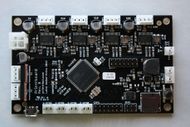Printrboard
This page is a development stub. Please enhance this page by adding information, cad files, nice big images, and well structured data!
Release status: working
| Description | Revision B
|
| License | unknown
|
| Author | |
| Contributors | |
| Based-on | |
| Categories | |
| CAD Models | Eagle
|
| External Link |
Contents
Introduction
The Printrboard electronic set was designed by members of the Printrbot team in order to eliminate the production and/or functionality shortcomings of older RepRap electronics sets. Printrboard improves upon the previous production-grade electronics set (Gen6) by adding heatbed and SD card support, reverting to 16x Allegro stepper drivers, and improving cost and connectivity reliability by elimination of the FTDI UART chip.
Printrboard is a derivative of Teensylu, originally based on Sanguinololu. It uses the same Atmel AT90USB1286 MCU as Teensylu, but integrates the stepper drivers, thus eliminating the need for separate Pololu boards. Like the Teensylu, the AT90USB has on-chip USB, removing the need for the FTDI USB UART. And like the Sanguinololu and the Teensylu, Printrboard also has expansion headers supporting I2C, SPI, UART, and ADC pins. All extra I/O ports of the AT90USB have been broken out to headers for prototyping and expansion.
Features
- Atmel AT90USB1286 Microcontroller (or AT90USB1287 drop-in compatible for 20mhz support)
- -- Native USB interface. No FTDI serial-to-USB chip!
- -- 128kb Flash
- Four integrated Allegro A4982 Stepper Drivers (no Pololus needed)
- Thermistor Connectivity: 2
- 2 N-MOSFETs for Extruder and Heatbed control
- 1 N-MOSFET for low power Fan or motor
- Onboard SD card slot
- Four Endstop connectors supplied @ 5V. Includes X, Y, Z, and fourth endstop called E-Stop to be used as an emergency stop, or extruder stop (to be added in firmware).
- Supports multiple power configurations (Carried from Sanguinololu)
- -- Logic & Motors supplied by ATX or laptop power supply (12-20V 120W minimum)
- -- Logic supplied by USB bus (if enabled by solder jumper)
- -- Logic supplied by on-board voltage regulator
- -- on-board USB connectivity
- Edge connectors enabling right-angle connections
- 14 Extra pins available for expansion and development, with the following capabilities
- -- UART1 (RX and TX)
- -- I2C (SDA and SCL)
- -- SPI (MOSI, MISO, SCK)
- -- PWM pin (1)
- -- Analog I/O (6)
- -- JTAG (uses some of the ADC pins)
- Additional 14 pin header with remaining I/O for prototyping
- SMT Components sized at 0805, and no QFNs for easier soldering.
- Small design - board is 100mm x 60mm (4" x 2.4")
Benefits of this Design
- Utilizes integrated Allegro 1/16 micro-stepping drivers for smooth operation.
- Fewer serial errors than Sanguinololu due to integrated USB controller.
- Lower cost due to integrated Allegro drivers and eliminated FTDI chip
- Uses small standard Molex connectors for motors, heater, and endstops.
Software
Compatible Firmwares
- Sprinter Sprinter: Supported, use MOTHERBOARD == 9.
- Marlin Marlin: No official support yet, but user Lincomatic has demonstrated success by modifying the pins.h configuration.
- Repetier List_of_Firmware#Repetier-Firmware: Supported, use MOTHERBOARD == 9
- grbl List_of_Firmware#Grbl: No official support yet, but works with Lincomatic's fork
(Other firmwares are currently untested but any firmware for an arduino mega should work with proper pin setup.)
Building Firmware
See Teensylu#Sprinter. See also Lincomatic's Bootloaders for AT90USB1286 article.
Schematics
Board and schematic on Github: [[1]]
Where to get it
It will be sold fully assembled with the Printrbot kits, and perhaps sometime in April from the http://printrbot.com/ store (expected opening 2012-03-09).
